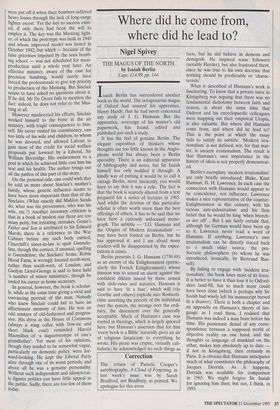Where did he come from, where did he lead to?
Nigel Spivey
THE MAGUS OF THE NORTH by Isaiah Berlin Cape, £14.99, pp. 144 Isaiah Berlin has surrendered another book to the world. The octogenarian magus of Oxford had assured his apprentice, Henry Hardy, that he had never concocted any study of J. G. Hamann. But the apprentice, sovereign of his master's old paperwork, has found, edited and published just such a study.
It has the feel of genuine Berlin. The elegant exposition of thinkers whose thoughts are too little known in the Anglo- phone world has always been a Berlin speciality. There is an editorial apparatus of bibliography and notes, but Sir Isaiah himself has only nodded it through. A kindly way of putting it would be to call it vintage Berlin; more insolently, you would have to say that it was a relic. The fact is that the book is scarcely altered from a text prepared for a series of lectures in 1965. And whilst the detritus of this particular scholar is often worth more than the best offerings of others, it has to be said that we have here a curiously unfocused mono- graph. The subtitle — `3.G. Hamann and the Origins of Modern. Irrationalism' may have been foisted on Berlin, but he has approved it: and I am afraid many readers will be disappointed by the expec- tations it raises.
Berlin presents J. G. Hamann (1730-88) as an enemy of the Enlightenment (partic- ularly the French Enlightenment) whose mission was to sound an alarm against the confident diktats issued by those armed with slide-rules and statistics. Hamann is said to have lit a fuse', which will (via Goethe and others) explode into Romanti- cism: asserting the priority of the individual over the system, the strange over the ordi- nary, the dissentient over the generally acceptable. Much of Hamann's case was rooted in theology, which is largely ignored here: but Hamann's assertion that for him `every book is a Bible' naturally gives an air of religious fanaticism to everything he wrote. His prose was cryptic, virtually cab- balistic; he acknowledged no such things as facts, but he did believe in demons and demigods. He inspired some followers (notably Herder), but also frustrated them, since he was true to his own doctrine that nothing should be predictable or 'charac- teristic'.
What is described of Hamann's work is fascinating. To know that a private tutor in Konigsberg was arguing that there was no fundamental dichotomy between faith and reason, at about the same time that Diderot and his encyclopaedic colleagues were mapping out their empirical Utopia, is also valuable. But where did Hamann come from, and where did he lead to? This is the point at which the essay fails to satisfy its subtitle. 'Modern irra- tionalism' is not defined; nor, for that mat- ter, is ancient irrationalism. The result is that Hamann's own importance in the history of ideas is not properly demonstrat- ed.
Berlin's exemplary 'modern irrationalists' are only briefly introduced: Blake, Knut Hamsun, D. H. Lawrence. In each case the connection with Hamann would appear to be coincidence, not influence. Lawrence makes a nice representative of the counter- Enlightenment in this century, with his vicious anti-industrialism and his firm belief that he would be king 'when breech- es are off . But I am fairly certain that, although his German would have been up to it, Lawrence never read a word of Hamann. If anything, Lawrence's own irrationalism can be directly traced back to a much older source, the pre- Socratic philosophers (to whom he was introduced, ironically, by Bertrand Rus- sell), By failing to engage with 'modem irra- tionalism', the book loses most of its force. It is better to have it than lose it to Oxford- shire land-fill, but so much more could have been done (which is perhaps why Sir Isaiah had wisely left his manuscript buried in a drawer). There is both a chapter and an appendix on Hamann's theory of lan- guage: as 1 read these, I realised that Hamann was indeed a man born before his time. His passionate denial of any corre- spondence between a supposed world of objective reality on one hand, and the thoughts or language of mankind on the other, makes him absolutely up to date if not in Konigsberg, then certainly in Paris. It is obvious that Hamann anticipates much of what constitutes the philosophy of Jacques Derrida. As it happens, Derrida was available for comparison in 1965. We might forgive Sir Isaiah for ignoring him then; but not, I think, in 1993.


































































 Previous page
Previous page